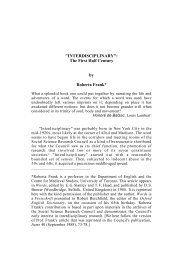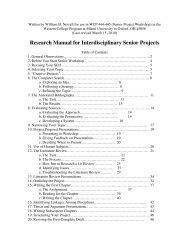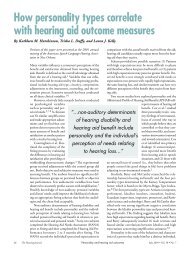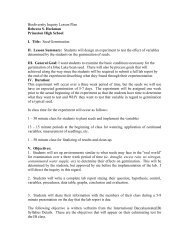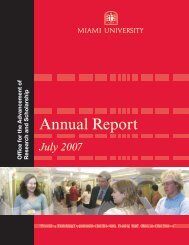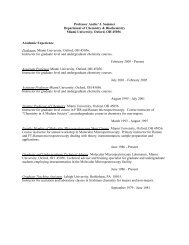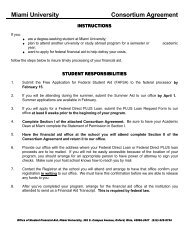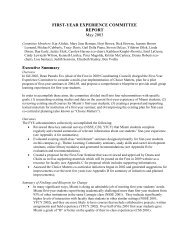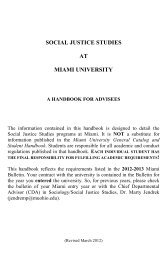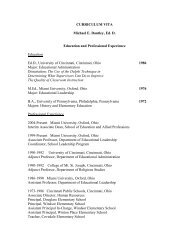Best of Miami Portfolios 2001 - Units.muohio.edu
Best of Miami Portfolios 2001 - Units.muohio.edu
Best of Miami Portfolios 2001 - Units.muohio.edu
You also want an ePaper? Increase the reach of your titles
YUMPU automatically turns print PDFs into web optimized ePapers that Google loves.
status. The Ranevskaya family is one <strong>of</strong> the most prominent families in Russia, and Oedipus is a<br />
king. According to common beliefs, these people cannot be wrong. They cannot represent<br />
ignorance. Chekhov and Sophocles use irony to emphasize this theme. The Ranevskaya family<br />
believes that they are a part <strong>of</strong> the “intelligentsia,” a term with which aristocrats label themselves.<br />
They look upon all others with disdain and feel superior to Lopakhin and Tr<strong>of</strong>imov. The irony is<br />
that Lopakhin eventually buys them out, and Tr<strong>of</strong>imov is the wise intellectual whom they mock for<br />
being the “eternal student.” Chekhov utilizes this intellectual to give light to the idea that “in<br />
Russia, only a very few work. They call themselves the intelligentsia, yet they belittle their<br />
servants, treat the peasants like animals, are wretched students, never read anything serious, and do<br />
absolutely nothing” (Chekhov 346). Tr<strong>of</strong>imov understands the aristocracy, and understands that<br />
because <strong>of</strong> their useless behavior, they are destined to become worthless. It was not a member <strong>of</strong><br />
the “intelligentsia” that came to this conclusion. Similarly, Sophocles devises an old, wandering<br />
blind man to reveal the truth to Oedipus. The irony <strong>of</strong> a blind peasant being able to see a truth that<br />
a king seemingly cannot or refuses to understand is the very essence <strong>of</strong> this universal theme. We<br />
are all equal. We are all equally inferior to the gods and must not be proud and think that we can<br />
understand a world which they created.<br />
There is a difference in the time and place settings in which these two pieces were written.<br />
Russia during the nineteenth century contained quite a different lifestyle than ancient Greece. At<br />
the time <strong>of</strong> Sophocles’ play, religion consisted <strong>of</strong> many deities, each in charge <strong>of</strong> a different aspect<br />
<strong>of</strong> life. Russia, on the other hand, has always been a dominantly monotheistic society. Although<br />
both places experienced different religious views, the message remains the same. Arrogance is an<br />
attempt at godliness, whether there be one god or many. The Greeks labeled this frequent<br />
occurrence as hubris, meaning excessive pride. Authors <strong>of</strong>ten write <strong>of</strong> the ignorance and sinfulness<br />
<strong>of</strong> excessive pride. Sophocles claims, “any mortal who dares hold / No immortal Power in awe /<br />
Will be caught up in a net <strong>of</strong> pain” (Sophocles l.844-846. 12 ). The “net <strong>of</strong> pain” to which he refers<br />
is a dreadful fate given by the gods. In this Greek society, arrogance was punishable by the gods.<br />
Remaining humble and accepting inferiority to the gods was the key to salvation. The situation was<br />
slightly different in Russian society. They did not believe that the gods took such an active role in<br />
the lives <strong>of</strong> humans, and it was not commonly thought that a god would specifically punish<br />
somebody. The Ranevskayas, however, do demonstrate that those who assume superiority in<br />
general are nothing but fools.<br />
The erudite Tr<strong>of</strong>imov sums up this universal theme:<br />
Whether or not the estate is sold today—does it really matter? That’s all done with<br />
long ago; there’s no turning back, the path is overgrown. Be calm, my dear. One<br />
must not deceive oneself; at least once in one’s life one ought to look the truth<br />
straight in the eye (Chekhov 357).<br />
As he comforts Lyubov while she awaits the news <strong>of</strong> what happened to the cherry orchard,<br />
she is still kidding herself with false hope, ignorant hope. She did not want to see the truth, and<br />
now her fate is sealed. Had she opened her eyes, things might have ended up differently. Tr<strong>of</strong>imov<br />
tells her to look the dreadful truth straight in the eye because she “served [her] own destruction”<br />
46



